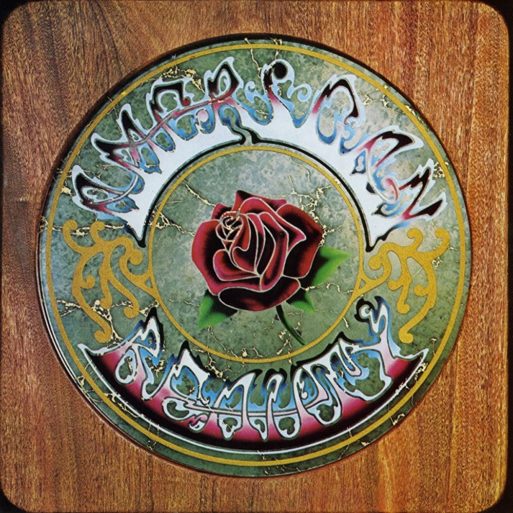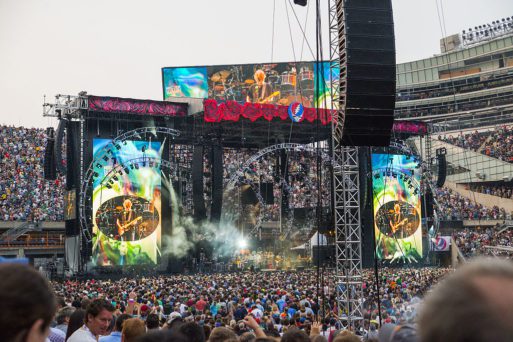 Few bands have earned status as cultural icons in the way the The Grateful Dead has. The band formed in 1965 in the hippie-heyday of San Francisco. Its most recognizable member, Jerry Garcia, composed a majority of the band’s musical repertoire, including “Brokedown Palace.” Its soothing poetic prose was written in 1970 by Robert Hunter, who wrote hundreds of the band’s epic songs spanning their decades-long history.
Few bands have earned status as cultural icons in the way the The Grateful Dead has. The band formed in 1965 in the hippie-heyday of San Francisco. Its most recognizable member, Jerry Garcia, composed a majority of the band’s musical repertoire, including “Brokedown Palace.” Its soothing poetic prose was written in 1970 by Robert Hunter, who wrote hundreds of the band’s epic songs spanning their decades-long history.
Although Hunter never revealed his personal intentions in writing “Brokedown Palace,” music historians agree the lyrics summon forth a sense of peace about death. This prophetic lullaby is the most requested eulogy in song played at funerals, memorials, and life celebrations for fans, or “Deadheads” as they are often affectionately known, across the globe.
All the birds that were singing
Have flown except you aloneGoing to leave this broke-down palace
On my hands and my knees I will roll, roll, roll
Make myself a bed by the waterside
In my time, in my time, I will roll, roll, roll

The Grateful Dead performing live
Credit: naleck, CC BY 2.0 via Wikimedia commons
The song opens with a sense of final exodus from the perspective of both the mourner and the deceased. There is a depiction of finality as the lone bird is left behind the soaring flock. If we believe our body is truly a temple, the nearly departed seems to discard their crumbling “Brokedown Palace” while seeking a final resting place.
Going to plant a weeping willow
On the banks green edge it will grow, grow, grow
Sing a lullaby beside the water
Lovers come and go, the river roll, roll, roll
The mighty breadth of the willow tree evokes a sense of hope. It stands firmly against the heavy tides of grief while freely swaying its branches to the comforts of a breeze. It is reminiscent of those who choose to plant a tree in honor of a loved one who has died. The willow stands tall as a testament to the finality of death, while inviting new life to bloom. Its roots, nourished by the waterside, will encourage it to grow, grow, grow.
Fare you well, fare you well
I love you more than words can tell
Listen to the river sing sweet songs
To rock my soul
If we close our eyes, we can almost hear those sweet songs of the river that are said to rock the soul. It may be that the departed are soothed by its sounds as they are laid to rest. Or maybe it is the mourner who is comforted by its melodic tune. Some may interpret it to mean that the river’s enchanting lullaby sways both souls into a welcome and solemn slumber.

A woman finds comfort in the branches of a willow tree
Both the willow tree and bodies of water are recounted often throughout the Bible. Both expressly symbolize God’s presence, often depicting a simultaneity of loss and hope, dignity and serenity, or life and death. But most deadheads would agree the lyrical tenets often expressed by the band characterize a religion much their own. Their many poignant tales told through song unequivocally bear credence to their namesake, The Grateful Dead.
“Brokedown Palace” appears on one of the band’s most celebrated albums, “American Beauty.” But The Grateful Dead considered itself a jam band and were not fond of studio recordings. The band allotted special sections behind the sound board at nearly all of their 2,350 live concerts for those wishing to record and share their music. Many of those original cassette recordings have been digitized. Over 17,000 live recordings from their concerts performed around the world are archived and free to explore here.
The band would often close their live shows with a harmonious rendition of “Brokedown Palace.” Here is a live recording from “Winterland Arena” on June 8, 1977:

 “Brokedown Palace” by The Grateful Dead
“Brokedown Palace” by The Grateful Dead


 National Donate Life Month Reminds Us To Give
National Donate Life Month Reminds Us To Give
 How Dare You Die Now!
How Dare You Die Now!
 Debating Medical Aid in Dying
Debating Medical Aid in Dying














